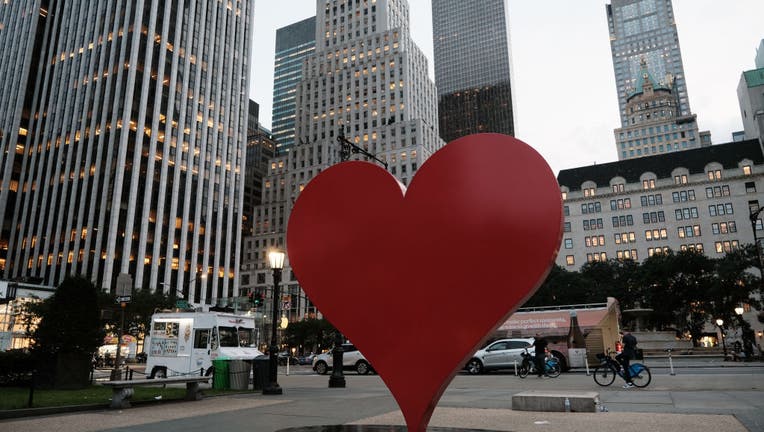Heartless! Artist says NYC COVID tribute removed in permit snafu

Newly installed Heroes Heart Monument is shown in Grand Army Plaza on October 25, 2021 in New York City. (Photo by Spencer Platt/Getty Images)
NEW YORK - Have a heart, New York!
A giant red heart sculpture installed this week in Central Park as a tribute to health care workers and COVID-19 victims has been taken down — an apparent casualty of confusion and red tape.
Italian sculptor Sergio Furnari says he was walking by the park Thursday afternoon with friends when he noticed that his "Heroes Heart Monument" was gone.
When he went to file a police report, he said, he was bounced from police station to police station until a police officer on Friday showed him video of people removing the 10-foot-tall, 3,000-pound (3-meter, 1,360 kilogram) monument and placing it on a truck.
"They literally broke my heart," Furnari said when reached Friday night.
Get breaking news alerts in the free FOX5NY News app! | Sign up for FOX 5 email newsletters
Furnari conceded he did not have a permit to place the heart in the park but considered a $4,000 grant he received from New York City's government to be his permit for the temporary installation. He said he considered the removal of his memorial "an abuse of power."
A message seeking comment was left with the Central Park Conservancy, the nonprofit that manages the park on behalf of the city. Furnari said he planned to go to the organization on Monday to find out what happened to his heart.
RELATED: White House outlines plans to increase COVID-19 testing in schools
Furnari said he wanted the sculpture to be a place for emotional and spiritual solace in the bustling city and not just a popular spot for selfies, though he said he was cool with that, too.
The work was an extension of another piece he created earlier in the pandemic: a life-size sculpture of a health care worker kneeling with arms stretched to the sky.
In an interview prior to the sculpture's removal, the artist explained his vision for the piece.
"Everybody suffers in different ways and needs all different types of comfort," Furnari said. "I hope this heart helps them remember their loved ones and cope with the grief. For a moment, they can forget about their problems."
___
Associated Press reporter Philip Marcelo in Boston contributed to this report.

